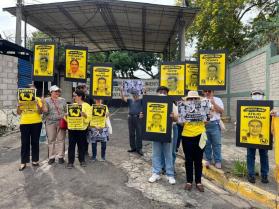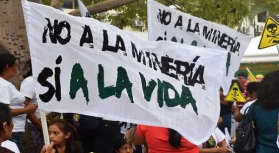Civil War Veterans Pressure Administration for Improved Benefits
Also included in this update:
- Public Hospital Ends Wrongful Firings of Union Workers
- Salvadoran Environmentalists Continue Push for National Metallic Mining Ban
- Fifty Central Americans Kidnapped in Mexico
OnJanuary 13, members of the Association of El Salvador of those Disabledin War (ALGES) - the largest organization of ex-combatants that suffered injuries during El Salvador’s Civil War - marched to the Legislative Assembly, demanding various reforms to the Benefits Law for those Injured and Disabled as a Consequence of the Armed Conflict. Thislaw was originally enacted following the signing of the Peace Accords that ended the Civil War in 1992, which committed the government of El Salvador to paying a pension and providing other benefits to the more than 40,000 people from both the armed resistance and military that weredisabled in the conflict and to the families of those who died. For many years, the governing right-wing administrations have made some payments to disabled veterans, but pensions have been small - about $50 amonth - and payment sporadic. Also, many families of those who died have been excluded from the pension system. In February of last year, President Funes recognizing the importance of the government debt to veterans of the conflict committed to beginning to pay off the $19 million owed in back pensions. ALGES’ demands included reforms related to an increase to the pensions, guarantees of comprehensive health care and the incorporation of parents of those who died in combat into the pension program. ALGES also applauded Funes and his administration for their unprecedented interest in this sector’s needs.
Thursday’smarch followed the January 9 end date of a 3-week occupation of San Salvador’s Metropolitan Cathedral by three other smaller organizations representing wounded veterans and family members of fallen combatants. The groups vacated the Cathedral after reaching an agreement with Funes’ Chief of Staff Alex Segovia to incorporate the groups into the government dialogue space that already exists with other organizations of disabled Civil War veterans, including ALGES. The organizations thatoccupied the Cathedral called for the pension to equal the urban minimum wage of $208 per month, to include thousands of families of those killed who are not currently receiving pensions in the pension program and that the government recognizes its debt of years of unpaid pensions and make concrete plans to pay these retroactively. The Catholic Church, while denouncing the protesters tactic and encouraging dialogue, reported that the organizations were respectful of the Cathedral during the occupation and even cleaned it before leaving.
Public Hospital Ends Wrongful Firings of Union Workers
OnDecember 13, five leaders of the Benjamin Bloom Children’s Hospital Workers Union (SITHBLOOM) celebrated their victory after the hospital dropped dismissal proceedings against them for protesting unsuitable hospital conditions, a victory won by the union along with pressure frominternational unions and solidarity organizations. On September 29, 2010, SITHBLOOM workers accompanied the hospital’s laundry workers in closing the laundry facilities to protest the hospital administration’s negligence of the facilities. Workers reported that machines were broken, making it impossible to provide child patients with clean linensand clothing. Rather than repairing the machines or purchasing new ones, hospital director Dr. Hugo Salgado Roldán told workers to ask their colleagues for permission to use laundry machines at other hospitals. After a 3-day occupation of the laundry facilities, during which time Dr. Salgado called in the police, workers and the hospital administration arrived at a peaceful solution mediated by Human Rights Ombudsman Oscar Luna. Both parties signed onto the agreement, the workers re-opened laundry facilities and Dr. Salgado agreed to repair equipment and purchase new machines. Within 48 hours, laundry facilitieshad functioning machines.
However,Dr. Salgado quickly began official dismissal proceedings against five of the union’s board of directors, in violation of the signed agreement that protected SITHBLOOM members from any retaliation. SITHBLOOM organized public protests against the dismissals and turned to its international allies to pressure the hospital administration. Unions from throughout Central America, the United States and Canada as well assolidarity organizations responded, sending letters to Dr. Salgado calling on him to respect the agreement and end firing proceedings. In the midst of hearings against the union leaders, Dr. Salgado dropped dismissal processes for all five leaders due to SITHBLOOM’s active resistance and the pressure generated by international solidarity. “Without the accompaniment of CISPES and the international unions, we would still be fighting these administrative processes. It is a true demonstration of the power of unity,” said SITHBLOOM’s Secretary GeneralMarielos Pleitez, one of the leaders who faced dismissal.
Salvadoran Environmentalists Continue Push for National Metallic Mining Ban
OnDecember 14, 2010, over 100 environmental protesters blocked traffic ona major thoroughfare in front of key government buildings to push the proposed national ban on metallic mining. The protesters - who includedresidents of the department of Cabañas and environmentalists - first gathered in front of the Ministry of Economy to deliver a letter demanding a firm stance in support of the ban. The National Roundtable Against Metallic Mining - a coalition of organizations opposed to the development of extractive projects in El Salvador - expressed concern that the Ministry’s ambiguous position on the law contradicts the firm position taken by President Funes against metallic mining and his publicsupport for the ban.
Followingthe protest in front of the Ministry of Economy, the demonstrators marched to the Legislative Assembly, where the Legislative Commission onthe Environment and Climate Change was receiving representatives of themining industry as part of their study of the law to prohibit metallic mining. After blocking traffic for a short while, the demonstrators gathered in front of the Legislative Assembly building where they demanded deputies approve the ban on metallic mining. Meanwhile inside the commission meeting, representatives of the mining industry continuedto argue that their gold and silver mining projects would provide significant income and jobs to the country without doing environmental damage - arguments that have been shown to be false by multiple independent studies.
Theright wing Nationalist Republican Alliance (ARENA) party voiced supportfor mining, with Deputy Vicente Menjívar commenting that “the country should take advantage of the benefits of exploiting gold / el país debe aprovechar los beneficios de explotar el oro.” The ARENA splinter party- the Grand National Alliance or GANA – held an ambiguous position, claiming concern for the environment but saying the country needed economic development. Meanwhile, the left wing Farabundo Martí NationalLiberation Front (FMLN) party voiced a clear rejection of metallic mining. While questioning a mining company representative on the supposed economic benefits, FMLN Deputy Lourdes Palacios prompted him toadmit that “Mining isn’t sustainable. It isn’t.”
Fifty Central Americans Kidnapped in Mexico
OnDecember 16, 2010, approximately 50 undocumented migrants from El Salvador, Honduras, and Guatemala were kidnapped in the Mexican state ofOaxaca while travelling on a freight train en route to the United States. The exact identities and nationalities of the victims remain unknown as many immigrants’ families cannot track the whereabouts of their loved ones during the dangerous trip north. Witnesses - includingseveral migrants who were able to escape - name the Zetas cartel as thekidnappers. According to El Salvador’s La Prensa Gráfica newspaper, the Zetas are demanding a $10,000 ransom for each kidnapped migrant.
Mexicanpriest Alejandro Solalinde, who runs a shelter for migrants in Ixtepec,Oaxaca, publicly denounced the kidnapping a week after it occurred whenthe Mexican government failed to publicly acknowledge reports of the crime. Government officials from El Salvador, Honduras, and Guatemala joined the denouncement and called for an exhaustive investigation as well as measures to protect migrants by the Mexican government. Following the denouncement, El Salvador’s Vice-Minister of Salvadorans in the Exterior, Juan José García, travelled to Mexico to follow the official investigation. Legislative deputies from the FMLN announced plans to meet with their Mexican counterparts to outline ways to protectundocumented migrants as they pass through Mexico. FMLN deputies also recently collected over 5,000 signatures from Salvadorans demanding comprehensive US immigration reform and sent it to President Obama via the US Ambassador in El Salvador.
Thistype of crime against migrants is startlingly common, with 222 kidnapping recorded by the Mexican government from January through October of 2010. However, the scope of this recent kidnapping is shockingly new. Another atrocity against a large group of Central American migrants, also attributed to the Zetas, came to light last August when officials uncovered the bodies of 72 migrants massacred in the Mexican state of Tamaulipas- 13 of whom were identified as Salvadoran. Kidnappings and executions of this scale perpetrated by organized crime syndicates capitalizing on this extremely vulnerable population represent a terrifying escalation of the risk faced by migrants en route to the US. Despite the tremendousdangers, undocumented immigration rates for Central Americans remain very high as poor economic conditions and violence at home continue to drive people to the North in search of jobs. Meanwhile, recent pushes by US lawmakers to further militarize the border with Mexico threaten tomake the path travelled by these migrants even more hazardous.

 "I am a CISPES supporter because continuing to fight for social justice and a more people-centered country means continuing the dream and sacrifice of thousands of my fellow Salvadorans who died for that vision.” - Padre Carlos, New York City
"I am a CISPES supporter because continuing to fight for social justice and a more people-centered country means continuing the dream and sacrifice of thousands of my fellow Salvadorans who died for that vision.” - Padre Carlos, New York City

